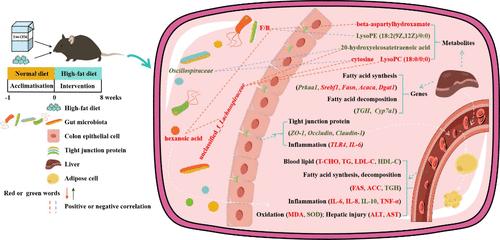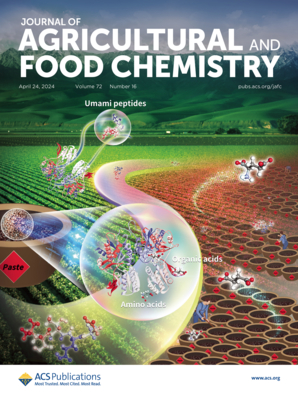Lactiplantibacillus plantarum Y44 Complex Fermented Milk Regulates Lipid Metabolism in Mice Fed with High-Fat Diet by Modulating Gut Microbiota
IF 6.2
1区 农林科学
Q1 AGRICULTURE, MULTIDISCIPLINARY
引用次数: 0
Abstract
The benefits of fermented milk containing Lactiplantibacillus plantarum (L. plantarum) Y44, known for its weight loss properties, remain unclear. For this, we evaluated the effects of the complex fermented milk (Y44-CFM), obtained through the cofermentation of cow’s milk and soybean milk with L. plantarum Y44 and traditional starters, on high-fat diet (HFD)-fed C57BL/6 mice. Our study found that the oral administration of Y44-CFM significantly reduced body weight gain and hepatic lipid accumulation in HFD-fed mice while also mitigating liver injury. Additionally, Y44-CFM regulated the expression of enzymes associated with lipid metabolism in the serum, as well as the corresponding or related genes in the liver, such as fatty acid synthase. Furthermore, HFD-induced systemic inflammation, oxidative stress, and intestinal barrier dysfunction were improved. The primary alterations in hepatic metabolism involved glycerophospholipids and amino acids, including the biosynthesis of valine, leucine, and isoleucine. The diversity and overall structure of the gut microbiota were also regulated, resulting in a significant decrease in the ratio of Firmicutes to Bacteroidetes (F/B) and unclassified_f_Lachnospiraceae, along with a notable increase in Oscillospiraceae. The correlation analysis indicated that Y44-CFM influenced hepatic lipid metabolism by mediating intestinal flora and its production of short-chain fatty acids, ultimately leading to weight reduction.

植物乳杆菌 Y44 复合发酵乳通过调节肠道微生物群调节高脂饮食小鼠的脂质代谢
含有植物乳杆菌(L. plantarum)Y44的发酵乳以其减肥特性而闻名,但其益处仍不清楚。为此,我们评估了复合发酵乳(Y44-CFM)对高脂饮食(HFD)喂养的 C57BL/6 小鼠的影响。我们的研究发现,口服 Y44-CFM 能显著降低高脂饮食小鼠的体重增加和肝脏脂质积累,同时还能减轻肝脏损伤。此外,Y44-CFM 还能调节血清中与脂质代谢相关的酶以及肝脏中相应或相关基因(如脂肪酸合成酶)的表达。此外,HFD 引起的全身炎症、氧化应激和肠屏障功能障碍也得到了改善。肝脏代谢的主要改变涉及甘油磷脂和氨基酸,包括缬氨酸、亮氨酸和异亮氨酸的生物合成。肠道微生物群的多样性和整体结构也受到了调控,结果是固着菌与类杆菌(F/B)和未分类的拉氏菌(f_Lachnospiraceae)的比例显著下降,而摇蚊科(Oscillospiraceae)的比例明显上升。相关分析表明,Y44-CFM 通过介导肠道菌群及其产生的短链脂肪酸影响肝脏脂质代谢,最终导致体重下降。
本文章由计算机程序翻译,如有差异,请以英文原文为准。
求助全文
约1分钟内获得全文
求助全文
来源期刊
CiteScore
9.90
自引率
8.20%
发文量
1375
审稿时长
2.3 months
期刊介绍:
The Journal of Agricultural and Food Chemistry publishes high-quality, cutting edge original research representing complete studies and research advances dealing with the chemistry and biochemistry of agriculture and food. The Journal also encourages papers with chemistry and/or biochemistry as a major component combined with biological/sensory/nutritional/toxicological evaluation related to agriculture and/or food.

 求助内容:
求助内容: 应助结果提醒方式:
应助结果提醒方式:


